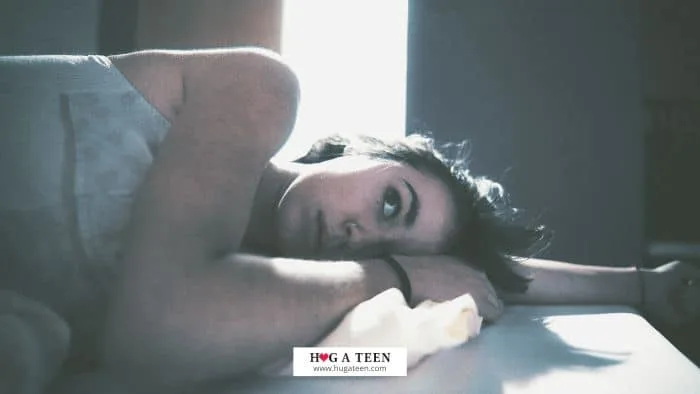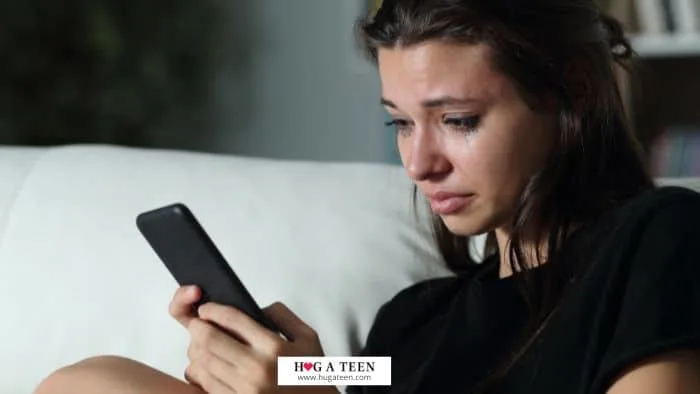The most common type of relationship concern for teenagers (irrespective of age or gender) is breakups. Teenagers are often new to the heartbreak of failed relationships, which can have physical, emotional, and social consequences. Romantic relationship concerns are therefore one of the main reasons why teenagers seek help from counselors.
This article looks at the effects of teenage breakups and discusses 14 ways in which parents can help their teens through the heartache.
- The Effects Of Teenage Breakups
- How To Break Up With Someone Respectfully (For Teenagers)
- How To Help Your Teen After A Break-Up?
- 1. Validate Your Teen's Emotions
- 2. Don't Try to Talk Them Out of Feeling Bad
- 3. Listen More, Speak Less
- 4. Don't Ask Too Many Questions
- 5. Encourage Them To Talk To Their Friends
- 6. Be On Their Side
- 7. Don't Speak Badly About Their Ex
- 8. Don't Make It About You
- 9. Discuss Social Media Usage
- 10. Encourage Them to Stay Busy
- 11. Stick To Routine
- 12. Assure Them That They Will Get Through This
- 13. Remember That You Can't Fix 'It.'
- 14. Look To The Future
- When To Seek Help
- Take Time Before Dating Again
The Effects Of Teenage Breakups
The effects of teenage breakups and failed relationships are generally downplayed or dismissed and do not receive the proper attention they deserve. However, studies suggest that relationship breakups are the leading cause of psychological anguish and a significant factor in teenage depression and suicide.

Emotional Effects Of Teenage Breakups
A breakup during adolescence can bring all kinds of misery, sometimes more severe than anyone anticipates. It’s vitally important for parents to understand how painful teen breakups can be and to look out for symptoms that might be more than common breakup reactions.
The article in Psychology Today titled “Adolescent Breakups,” by psychologist Carl Pickhardt, suggests that teenage boys tend to react with anger and frustration more than their female counterparts. In response to rejection from their crush, teenage girls tend to turn their emotions inward, causing them to feel worthless.
Let’s look at some of the emotional effects of a breakup:
1. Anger: Teens may react with anger and frustration after a breakup, depending on the length and intensity of the relationship and who initiated the split. This can manifest as aggressive or withdrawn behavior. It’s important for teens to find healthy ways to process their emotions and not take out their anger on themselves or others.
2. Depression: Breakups can lead to feelings of hurt and rejection, and it’s normal to struggle with emotions such as anger or depression for a while. It’s important for teens to seek support from friends and family and to talk to someone if they are feeling overwhelmed. They may also benefit from therapy or counseling if they’re struggling with severe depression.
3. Trauma: Symptoms like flashbacks, nightmares, severe anxiety, and uncontrollable thoughts about the event can result from a breakup and may require professional help if they interfere with daily life. Teens may benefit from trauma-focused therapy or other forms of treatment.
4. Hurt: Being rejected by someone you care about can be incredibly painful, especially for teens who may not have gone through a breakup before. It’s important for teens to take care of themselves and focus on self-love and healing during this time.
5. Acting Impulsively: In the heat of the moment, teens may make impulsive decisions or engage in risky behavior as a result of a breakup. They need to take time to process their emotions before making any decisions that could have negative consequences.
6. Intrusive Thoughts: Unwanted and repetitive thoughts about the breakup can be distressing for teens. It’s important for them to find healthy coping mechanisms, such as journaling, exercise, or mindfulness practices, to manage these thoughts and move forward.
❤️ Suggested reading: 150+ Positive Affirmations for Teens
7. Suicide: In severe cases, a breakup can lead to thoughts of suicide or self-harm. Although the extent to which romantic relationship issues contribute to a teen experiencing suicidal thoughts or behaviors, it’s important to seek immediate help from a trusted adult, a crisis helpline, or a mental health professional if you’re worried about their mental health.
❤️ Suggested reading: Learn a variety of coping skills that teens can use to help them navigate the ups and downs of adolescence.
Physical Effects Of Teenage Breakups
Teenagers who suffer relationship breakdowns are more likely to experience varying levels of depression, sleeplessness, and even self-harm. In addition, they may experience trauma symptoms. Teenage actions are more likely to be impulsive, and the impact can be lasting.

Let’s dive in and explore the physical effects of teenage breakups:
1. Lower Heart Rate: A study conducted by the University of Amsterdam, published in the journal “Psychological Sciences,” found that after a breakup, a person’s heart rate may slow down. This can lead to a physical sensation of heartbreak, where the person feels like their heart is actually breaking. It’s important to remember that this is a normal reaction to rejection, but it can be helped with support from loved ones and counseling.
2. Feelings Of Withdrawal: Love and drugs are similar in terms of highs; therefore, a breakup can feel like physical withdrawal. In teenagers, hormones are more intense and all over the place when falling in love. According to Dr. Rahul Jandial, M.D., Ph.D., brain hormones and chemicals are totally dominant in adolescents, and teen brains haven’t learned to contextualize situations, such as breakups, yet.
3. Sleeplessness: When a teenager goes through a breakup, they may have trouble sleeping or appear tired. You may also notice changes in their behavior, such as keeping to themselves more and not eating much. These symptoms can be linked to the emotional turmoil the teen is experiencing and can be addressed through talking with a trusted friend, family member, or therapist.
4. Substance Abuse: Teenagers who experience the end of romantic relationships or move quickly from one relationship to another may experience increased substance use. This could be due to the depression they may feel, as well as changes in their social circle. It’s crucial to be aware of this behavior and offer support and resources to help the teen deal with their emotions in a healthy way.
5. Self-harming: Some teens may resort to self-harming behaviors as a means of coping with the emotions brought on by a breakup. This can include cutting, burning, or other forms of self-injury. If you suspect that your teen may be engaging in this behavior, it’s important to seek help from a mental health professional as soon as possible.
Social Effects Of Teenage Breakups
Some breakups are so painful that they adversely affect the functioning of a person’s social, academic and personal life and may also adversely affect their relationship skills and competency in later relationships.
You should also note that there may be gender differences in how teens will behave after a breakup. Because girls go through puberty earlier than boys and take breaking up more seriously, it may affect them more than boys. However, don’t underestimate the emotional pain your son might be feeling.

1. Personal Functioning: You might notice that your teen tends to stay in their room more after a breakup. They may also begin to ignore household duties or fall through on their commitments.
2. Social Acceptance: Peer relationships may also be effected. There is often gossip in high school about who likes who and who is in the latest couple, making a teenager feel socially excluded if they’re no longer in a relationship. A lot of teenagers tend to depend on romantic relationships as a form of social acceptance. Being in a relationship, in their opinion, is a sign of maturity.
3. Social Functioning: Teens may lose interest in activities that they used to enjoy and may avoid extracurricular activities, work, friends, and school. After a breakup, an older teen may also suffer social exclusion if they avoid certain events their ex may attend.
4. Academic Functioning: Students may have difficulty concentrating or solving problems, which affects their academic performance.
How To Break Up With Someone Respectfully (For Teenagers)
For whatever reason that makes you decide to break up with someone, remember that this is somebody with whom you had a deep connection and feelings. You want to be kind but firm with your decision without being hurtful.

Breaking up with someone is never easy, especially when you care about them. However, it’s important to end a relationship in a respectful way. Here are some tips on how to do it:
Do’s:
- Pick the right time: When breaking up with someone, try to pick a time that is unimportant in their lives, and avoid breaking up at family events, on birthdays, or during exams or project deadline periods.
- Be honest: Explain your reasons for ending the relationship and be clear about your intentions.
- Be direct: Don’t beat around the bush or make your partner guess what’s going on. Be clear and concise.
- Be considerate: Choose a quiet, private place where you can talk without distractions.
- Listen: Allow your partner to express their feelings and listen to what they have to say. However, stay firm in your decision.
- Be kind: Use language that is respectful and non-judgmental. Avoid blaming or name-calling. They may get angry, so don’t take the bait and try to stay calm.
- Give space: Give your partner the time and space they need to process the breakup.
Don’ts:
- Don’t break up on social media: You might be tempted to do it through text, but it’s better to have a face-to-face conversation or a call if meeting in person is hard. Middle school boys reported breaking up over text to be easier as it was too hard to see their ex sad. However, if that person meant something to you, it’s more mature to call them if possible.
- Don’t ghost: Don’t just disappear without any explanation. Your partner deserves closure.
- Don’t block them: Unless they’re sending abusive messages and you need to protect yourself, it’s better to try and stay friends rather than cutting them out of your life altogether.
- Don’t bring up the past: Avoid blaming your partner for past mistakes or problems.
- Don’t make false promises: Don’t promise to stay friends if you don’t intend to.
- Don’t use the breakup as an opportunity to hurt your partner: Avoid saying hurtful things just to make yourself feel better.
Breaking up with someone can be difficult, but it’s important to do it in a way that respects both you and your partner. Remember to be honest, direct, considerate, and kind, and to give each other space. By following these guidelines, you can make the process as painless as possible and preserve the dignity of both people involved.
The truth is whichever way you do it, the other person will still be hurt and have a difficult time, but if you do it in a kind and respectable way with no intention of causing them harm, then it will make it easier.
Watch Matthew Hussey share his top tips on how to successfully break up with someone in the video below:
How To Help Your Teen After A Break-Up?

Whether you’re trying to find ways how to help your teenage daughter deal with a breakup or are worried for your son after a breakup, there are several things that will help you navigate this heart-wrenching period of time.
Although boys might react differently to girls, they will be feeling the emotional, physical, and social effects of a breakup, and it’s up to you as their parent to help guide them through it.
1. Validate Your Teen’s Emotions
When your teen goes through a breakup, it is essential to validate his or her emotions. Try not to minimize their feelings. Just because they’re young doesn’t mean that the pain isn’t just as significant as an adult’s broken heart.
We often say things to minimize their pain, but by doing that, we actually make them feel alone and that their emotions are not genuine or important.
Instead of saying, “you’re too young for a serious relationship anyway,” rather let them know that you understand their pain. You can say things like, “I’m sorry that this happened,” or “it must be very painful for you right now.”
Remember that both boys and girls will feel the pain of a broken heart similarly. They may not show it in the same way, though.
❤️ You can share some of these inspirational teenage breakup quotes with your teen to show them you understand and care about their heartache.
2. Don’t Try to Talk Them Out of Feeling Bad
Moving on from a broken heart is a process that takes time. Even if it feels like your child is in the deepest depths of a mood, they still need their own space and time to find their way out.
It’s also crucial for you to give your child space to heal and understand what is happening before you try to bring him or her out of that state. You need to be there for them, but they should be in charge of their own healing process.
3. Listen More, Speak Less
Focus on letting your daughter vent without focusing on trying to fix it. It is incredibly therapeutic for your daughter to talk and feel heard at this point.
Determine how they feel about their relationship ending. Please encourage them to express their emotions. Anger, fear, and sadness are all normal feelings — but your teen will need to process these feelings before moving on.
They need time and a safe space to vent their frustration, confusion, and pain. You can advise at a later stage once the pain is considerably less.
Let them talk, and if they want advice once their emotions have calmed down, then that’s the right time to give it.
4. Don’t Ask Too Many Questions
As much as you might want to know exactly what happened and who said what, it’s better not to probe too much. They will probably feel more comfortable talking to their friends, so give them space to talk to you then they’re ready and tell you what they feel comfortable discussing.
5. Encourage Them To Talk To Their Friends
Sometimes they would prefer to get support and validation from their friends. This shows your teenager that they’re not alone in their struggles.
Invite some of their close friends for a sleepover so they can discuss their feelings in a safe environment.
Many teens are going through the same experiences and emotions, so it helps to know they’re not alone.
6. Be On Their Side
Try not to discuss whose fault it is or place blame. They need a non-judgmental ear to listen and be there for them. Support them and let them know that you’re in their corner.
7. Don’t Speak Badly About Their Ex
Saying negative things about their ex won’t make the pain any less. Rather stay neutral.
It’s better if, in time, they remember the positives about their past relationships. It’s great if they’re able to stay friends with an ex rather than never wanting to speak to them again.
It’s part of being able to deal with a breakup maturely and helps them move on.
If your teen is harboring resentment, encourage them not to speak ill of the other person. Some teens feel so much jealousy that they are unwilling to trust the other person again.
8. Don’t Make It About You
We’re all tempted to let someone know that we understand what they’re going through by sharing our own stories. Although it might seem relevant, it’s not what they need from you right now.
Instead, let them share their own experience and emotions with you – remember that it’s their story and their pain.
If your teen asks, then you can share a short story (don’t go into detail) highlighting that they might not feel that they’ll get through this, but they will in time.
9. Discuss Social Media Usage
It’s very common for teens to share everything on social media. It might be a good time to take a bit of a break from social media right now, especially as their ex might change their relationship status, or share a status update.
They might say something they might regret later. For example, don’t badmouth your ex, or post personal details about the split.
Teens are not always mature enough to handle a breakup respectfully. They may need your advice on what they shouldn’t share publicly.
10. Encourage Them to Stay Busy
Try to provide some distractions and to keep them busy. This will help your child avoid thinking about their breakup.
Choose whatever activity they enjoy, like shopping or going to a ball game. Outdoor activities are very therapeutic, like going for a long walk or enjoying some time on the beach.
Another distraction could be to work on a project together, like redecorating their room. Activity not only keeps your teen off social media, but it reminds him/her that life has a lot to offer, even when they’re single.
11. Stick To Routine
As soon as possible, stick to their usual routine. They might need a few days to wallow, but the regular daily routine will also fill their days and keep them busy as with distractions.
Although you still need to be sensitive to your teen’s feelings, you should try your best to treat them normally. You may not realize that treating them differently for too long or repeatedly bringing it up could just be reminding them of their heartbreak.
12. Assure Them That They Will Get Through This
You might want to explore the possible positives of the breakup with them if they’re open to the idea. Tread lightly, as they might not be open to this in the beginning. When they’re ready, you can bring up these ideas.
Was there an activity that they enjoyed but drifted away from as a result of the relationship? Did they lose touch with an old friend?
A 2003 study of people who had recently been through a breakup found that every participant could identify at least one positive outcome from the breakup.
The average participant provided five positive life changes — such as the ability to spend more time with friends and learning not to jump into a relationship too quickly. In addition, participants also reported increases in positive emotions such as relief and joy, increased self-confidence, and personal growth.”
washingtonpost.com
Watch this interesting video on how “Breakups don’t have to leave you broken”:
13. Remember That You Can’t Fix ‘It.’
As much as you’ll want to, you cannot heal their broken heart. They need time to get over it.
Your job is to support them and let them feel understood and loved.
This is a life lesson that they will probably grow through several times in their life. Not only with romantic relationships but also friendships. They’re learning how to deal with disappointment in life.
14. Look To The Future
Remind them that they have their whole life ahead of them. They will meet many new and interesting people and will most likely have several relationships. Each stage of life brings new experiences and opportunities to meet new people.
Watch this video which offers clear advice on how to help your teenager deal with a breakup:
When To Seek Help
Stressful life-events are considered to be risk factors for the development of depression. If your child does not show any visible signs of getting over the breakup in time, it might be advisable to speak to a therapist.
When your child feels particularly depressed, hopeless, feels worthless, or isn’t sleeping well, or when their ability to function is impaired for long periods after the breakup, it might be time for them to seek help.
Take Time Before Dating Again
Encourage them not to rush into another relationship because it’s too soon or too soon after a breakup. Registering feelings can take time, making it harder for your teen to think clearly and make dating decisions.
It’s important to determine when your teen is ready to date again. This can vary depending on what they’re going through at the time, but generally, it’s best for them to wait a few months after breaking up before looking for a new partner.
Continue being understanding and encouraging whenever they talk about their feelings. You need to be patient while they heal from their first broken heart.
Key Takeaways:
- It’s best to allow your teenagers to express their big emotions so they can address them properly.
- Focus on their experiences by asking questions allowing them to express everything that is on their mind without being judgmental.
- We can help them by allowing them to have a support system that allows them to talk to others without feeling as much pressure.
- It’s important to understand that your child’s emotions are real and let them express their feelings. Don’t try to minimize the hurt by minimizing their feelings.
- Focus on their experience. You might be tempted to share stories of your own past break-ups, but now is probably not the best time. Rather listen and ask them questions about their situation.
- Sometimes it’s necessary to give them space.
- Be there for them, and plan to have further conversations to help them navigate future relationships down the line.
No matter how the conversation plays out, the most important thing you can do for your teenager is to be present. Let them know you are with them through the emotional ups and downs of life—including dating life.
